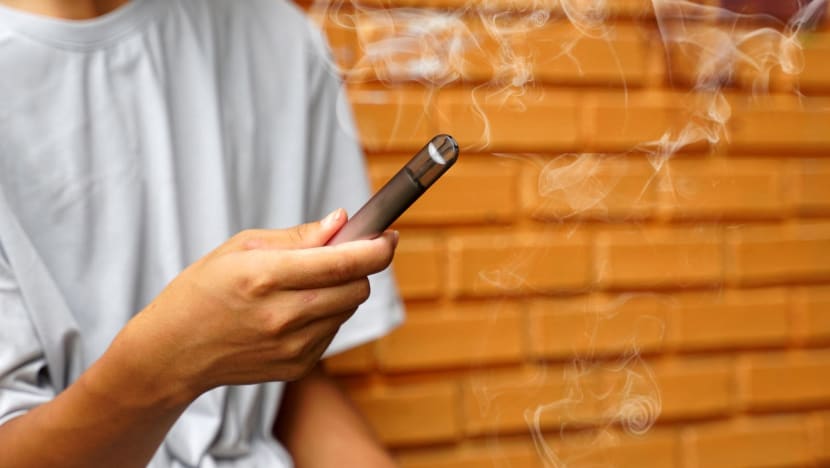Eviction from halls, suspension and even expulsion: How universities, polytechnics are cracking down on vaping
Nanyang Technological University (NTU) appears to be taking the toughest stance, with expulsion on the cards for serious cases of students caught vaping.

Institutes of higher learning are clamping down on vaping while offering more support to those seeking to quit. (File photo: iStock)

This audio is generated by an AI tool.
SINGAPORE: From S$300 (US$230) fines to suspension and even expulsion, universities and polytechnics are getting tougher on those caught vaping on campus.
Some are increasing security patrols, and many are offering support for those who want to kick the habit.
The moves by institutes of higher learning (IHLs) come amid a national push to clamp down on vaping, which saw Prime Minister Lawrence Wong mentioning the issue during his National Day Rally speech.
“So far we’ve treated vaping like tobacco – at most we impose a fine. But that’s no longer enough,” he said.
Moving forward, Singapore will treat vaping as a “drug issue” and step up enforcement.
Apart from “much stiffer” penalties, which include jail sentences and more severe punishments for those selling vapes with harmful substances, a public education drive will also kick off at schools, IHLs and during National Service.
Currently, those caught for purchase, use and possession of e-vaporisers, or vapes, are referred to the Health Sciences Authority (HSA) and subjected to a fine of up to S$2,000.
As part of the campaign against vapes, bins have been placed in community clubs and universities across Singapore under the “Bin the Vape” initiative.
Devices can be surrendered at these bins without penalties for the users.
ZERO-TOLERANCE APPROACH
Among the IHLs, Nanyang Technological University (NTU) appears to be taking the toughest stance.
In an email from the President’s Office on Friday (Aug 15), the university said it will adopt a zero-tolerance position toward vapes and etomidate-laced vapes known as Kpods to protect the well-being of the community.
To become a 100 per cent vape-free campus, NTU may conduct random bag checks, and will have security officers check vaping and smoking hot spots as well as designated smoking areas to ensure rules are followed, said the email, which was seen by CNA.
“Any student or employee found vaping will be subject to disciplinary action, including mandatory counselling and, in serious cases, possible expulsion or termination,” NTU said, adding that it will also report offenders to the authorities.
An advisory posted online said the prohibition on vaping also applies to students when they are off campus, if they are representing the university in Singapore, such as on internships or work attachments.
First-time offenders will face a S$300 fine and eviction from halls. They may also be barred from on-campus housing for the rest of their time as a student, and be sent for national smoking or vaping cessation programmes.
“Depending on the severity of the case, students may face sanctions by the university, which will be decided by the Board of Discipline,” an NTU spokesperson said in response to CNA’s queries.
Singapore University of Social Sciences (SUSS) students and staff caught vaping also face sanctions including suspension, expulsion, fines or being required to attend a cessation programme, the university said.
In response to queries from CNA, an SUSS spokesperson said that its security staff conduct regular patrols and use closed-circuit television surveillance to deter and detect violations.
"OPENLY VAPING" ON CAMPUS
From January 2024 to March 2025, about 2,600 students were referred to the HSA by schools and IHLs for vaping.
A final-year student from NTU who gave his name as AK said that before the recent crackdown, vaping was a normalised practice among his social circles.
People would often vape at smoking corners or even during group project discussions. When students hang out in a dormitory room, a vape might get passed around, he said.
“It's a very in-the-moment kind of thing, and I guess it also seems less harmful compared to smoking. So I guess people are more willing to kind of give it a try,” he said.
Apart from students, a staff member who gave his name as John raised concerns about vaping among staff at NUS.
One of the most uncomfortable episodes occurred when three or four colleagues vaped in a small air-conditioned room.
“I find myself being a bit concerned as to, like, what am I breathing in?” he said.
Although an email was sent out to warn that vaping is illegal, he is not aware of the university taking action against any staff members who have continued the habit.
Other universities and polytechnics said they have whistleblowing channels for reporting vape-related behaviour and will take action against those who commit offences.
Their policies are communicated through posters displayed on campus, including in toilets and sports halls.
Several schools said they inform students about the anti-vaping stance during orientation briefings, with the Singapore University of Technology and Design making use of government advisories to “reinforce the seriousness” of drugs and vaping, said chief communications officer Tammy Tan.
Nanyang Polytechnic additionally briefs students on its guidelines against vaping – and the consequences of flouting them – at the start of each academic year, while the Nanyang Academy of Fine Arts also shares email reminders on the dangers of vaping.
An NUS spokesperson said staff and students face “severe disciplinary actions” if caught vaping, and will be reported to the authorities. Students who live on campus may be suspended or barred from housing.
A spokesperson from Republic Polytechnic said it has stepped up efforts, including increased patrols by security officers and discipline masters, and training staff and student leaders to look out for signs of addiction.
Temasek Polytechnic said it is working with the Ministry of Education and the HSA to introduce vape detectors on campus.
It also acknowledged the need for support, and said parents and guardians are informed when students are caught with vapes.
The Singapore Institute of Technology said its counsellors are available to provide emotional and psychological support, and Singapore Polytechnic said it will support students who voluntarily seek counselling, including by providing referrals to external services if necessary.
“We recognise that students may turn to vaping for various reasons – such as stress, peer influence, or curiosity – and encourage those who wish to stop vaping to seek confidential support,” Singapore Management University’s (SMU) spokesperson said.
Assistant Professor Yvette van der Eijk of the NUS Saw Swee Hock School of Public Health said more emphasis needs to be put on supporting youths who are struggling and need help kicking their vaping addiction.
“Certainly, penalties will deter some youths, but not all of them,” she said, adding that people may continue to vape out of defiance or because they are dealing with deeper issues with their mental health.
Safe pathways – such as the "Bin the Vape" initiative – should be a mainstay of Singapore’s vaping prevention strategy, she added.
“That way, those youths who are addicted to vaping, especially to Kpods, would feel safer in coming forward to seek help,” she said.
HAVE MEASURES BEEN EFFECTIVE?
With recent scrutiny on vaping, students CNA spoke to have observed fewer people vaping openly on campus.
AK, 25, said he knows of two or three acquaintances who have stopped vaping – although they continue to smoke cigarettes.
Increased bag checks as part of NTU’s efforts to clamp down on vaping are a “good first step”, he said. But he pointed out that students may still find ways to hide their vapes.
A second-year business student from SMU, who wanted to be referred to as Manuel, said he stopped vaping since the authorities announced that tighter enforcement would kick in. He used to vape socially in drinking settings, about once or twice a month.
He is not aware of his school’s policies on vaping, but feels that the "Bin the Vape" initiative is a step in the right direction.
Still, education might be a more effective approach.
“If people wanted to (quit vaping), they could just throw it in (any) bin, right?” he said. “I think, more importantly, if they really want to eradicate it, it needs to start from young.”
KL, a final-year student from NTU who quit vaping last September, said the school’s crackdown on vaping feels “sudden”. A better approach might be to ease the transition to punitive measures, she said.
People may already be addicted to vaping, she said. “So for them to go from vaping one day to (not) vaping the next day would be quite hard.”
The 22-year-old, who had picked up vaping in secondary four, said she and some peers feel sceptical about certain anti-vaping initiatives, such as vape bins. She questioned whether those who give up their vapes can truly remain anonymous and will not be penalised.
“At the end of the day, we are just students, and members of staff, or even like authorities in general, are kind of like strangers to us. So it's very hard to just, you know, seek help and support,” she said.
Mr Wong, a fifth-year student from SUSS who declined to share his full name, said that more support could come from fellow students instead of professors.
He has observed that student clubs are where many students spend their time, he said.
“So I think the school should probably collaborate more with those student clubs to be able to reach a wider student audience.”




















